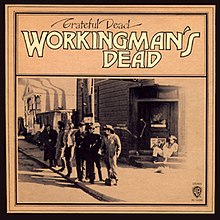
Workingman's Dead is the fifth album by the rock band the Grateful Dead. It was recorded in February 1970 and originally released on June 14, 1970.
In 2003, the album was ranked number 262 on Rolling Stone magazine's list of the 500 greatest albums of all time.
It was reissued in 2003 in three different formats: as part of the The Golden Road (1965-1973) 12-CD box set, as a remastered and expanded CD, and as a DVD-audio release. The first two contain eight exclusive tracks not found on the original 1970 release while the latter contains just the original tracks rendered in DVD-audio.
Contents
The title of the album comes from a comment from Jerry Garcia to lyricist Robert Hunter about how "this album was turning into the Workingman's Dead version of the band".[6]
The band returned to the Pacific High Recording Studio in San Francisco to record the album and spent just nine days there. Garcia noted that "let's do it all in three weeks and get it the hell out of the way".[7] Besides the weight of their debt in producing their previous album, Aoxomoxoa, the band was also dealing with the stress of a recent drug bust in New Orleans—which could have possibly resulted in jail time—and their manager Lenny Hart (father of drummer Mickey Hart) skipping town with a sizable chunk of the band's wealth. "In midst of all this adverse stuff that was happening ... [recording the album] was definitely an upper," said Garcia in an interview.[8]
Garcia has commented that much of the sound of the album comes both from his pairing with Hunter as well as the band's friendship with Crosby, Stills and Nash. "Hearing those guys sing and how nice they sounded together, we thought, 'We can try that. Let's work on it a little,'" commented Garcia.[9]
Songs such as "Uncle John's Band", "High Time", and "Cumberland Blues" were brought to life with soaring harmonies and layered vocal textures that had not been a part of the band's sound until then. According to the 1992 Dead oral history, Aces Back To Back, in the summer of 1968, Stephen Stills vacationed at Mickey Hart's ranch in Novato. "Stills lived with me for three months around the time of CSN's first record," recalls Hart, "and he and David Crosby really turned Jerry and Bobby onto the voice as the holy instrument. You know, 'Hey, is this what a voice can do?' That turned us away from pure improvisation and more toward songs."
Warner Bros. released "Uncle John's Band" backed with "New Speedway Boogie" as a single, but it received limited airplay. This was neither, as once postulated, because of length issues nor concerns about profanity, since the single issue had been edited to a very radio-friendly three-minute length and the word "goddamn" removed. "Casey Jones" was also released as a single, but did not chart in the U.S.
Lyricist Robert Hunter appears as the seventh member on the cover of the album.
The album was voted by readers of Rolling Stone as the best album of 1970, in front of Crosby, Stills, Nash and Young's Déjà Vu and Van Morrison's Moondance.[6]
Side one
No. Title Length
1. "Uncle John's Band" 4:42
2. "High Time" 5:12
3. "Dire Wolf" 3:11
4. "New Speedway Boogie" 4:01
Side two
No. Title Length
5. "Cumberland Blues" (Garcia, Hunter, and Phil Lesh) 3:14
6. "Black Peter" 5:41
7. "Easy Wind" (Hunter) 4:57
8. "Casey Jones"
Released June 14, 1970
Recorded February 1970
Genre Country rock, rock
Length 35:33
Label Warner Bros.
Producer Bob Matthews
Betty Cantor
Grateful Dead
